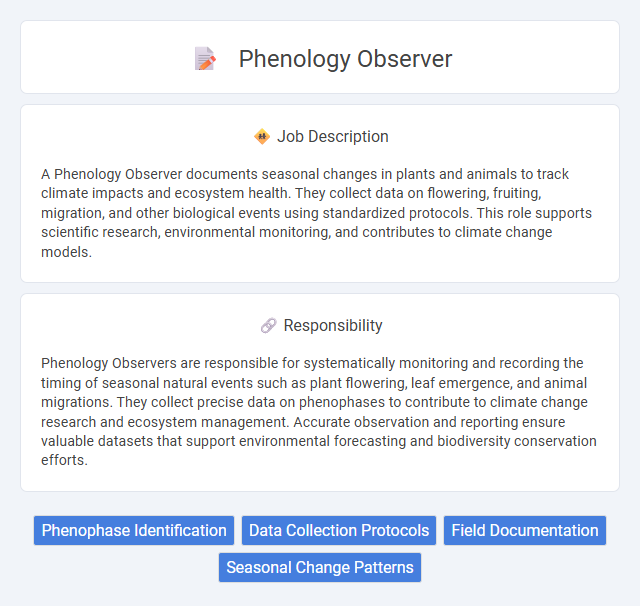
A Phenology Observer documents seasonal changes in plants and animals to track climate impacts and ecosystem health. They collect data on flowering, fruiting, migration, and other biological events using standardized protocols. This role supports scientific research, environmental monitoring, and contributes to climate change models.
Individuals with a keen interest in nature and strong observational skills are likely suitable for a Phenology Observer role, as the job requires detailed monitoring of plant and animal life cycles. Candidates who enjoy spending time outdoors and working independently may find this position highly fulfilling. However, those uncomfortable with variable weather conditions or repetitive data collection tasks might face challenges adapting to this role.
Qualification
A Phenology Observer must possess strong analytical skills and a keen eye for detail to accurately record plant and animal seasonal changes. Proficiency in data collection techniques and experience with GPS technology or mobile data entry tools are essential qualifications. Background knowledge in biology, environmental science, or ecology enhances the ability to interpret phenological patterns and contribute valuable insights to climate change research.
Responsibility
Phenology Observers are responsible for systematically monitoring and recording the timing of seasonal natural events such as plant flowering, leaf emergence, and animal migrations. They collect precise data on phenophases to contribute to climate change research and ecosystem management. Accurate observation and reporting ensure valuable datasets that support environmental forecasting and biodiversity conservation efforts.
Benefit
The Phenology Observer role likely offers the benefit of contributing valuable data to climate change research and ecological monitoring, enhancing scientific understanding of seasonal plant and animal cycles. Participants probably gain hands-on experience in field observation techniques and data collection, which can strengthen skills relevant to environmental science careers. Engaging in this job may also provide opportunities to collaborate with research institutions and be part of a community dedicated to environmental conservation efforts.
Challenge
The role of a Phenology Observer probably presents challenges in accurately tracking and recording seasonal biological events due to unpredictable environmental variables. Adapting to variable weather conditions and changes in plant and animal behaviors likely requires keen attention to detail and flexibility. Ensuring data consistency and reliability might also be difficult when working in remote or diverse ecosystems.
Career Advancement
Phenology Observers play a crucial role in tracking seasonal changes in plant and animal life, contributing valuable data for climate and ecological research. Career advancement opportunities include progressing to senior research analyst roles, project management positions, or specializing in data science and environmental modeling within governmental or academic institutions. Developing expertise in geographic information systems (GIS), remote sensing, and statistical analysis enhances job prospects and leadership potential in environmental monitoring programs.
Key Terms
Phenophase Identification
Phenology Observers specialize in phenophase identification by accurately recording the timing of life cycle events such as flowering, leaf emergence, and fruiting in plants. They use detailed observational techniques and standardized protocols to monitor phenophases, enabling critical data collection for climate change research and ecological forecasting. Their precise phenophase data supports ecosystem management and biodiversity conservation efforts.
Data Collection Protocols
Phenology Observers adhere to strict data collection protocols to ensure accurate monitoring of plant and animal life cycle events. They systematically record observations such as flowering, leafing, and migration timings using standardized methods to maintain consistency across seasons and locations. These protocols include precise timestamping, geographic tagging, and use of validated phenophase definitions to support reliable ecological research and climate change studies.
Field Documentation
Phenology Observers meticulously record seasonal plant and animal life cycle events, ensuring precise field documentation of growth stages, flowering times, and migration patterns. Accurate data collection supports climate change research and ecological forecasting by providing essential information on species responses to environmental shifts. Proficiency in GPS mapping, timestamping observations, and standardized data entry protocols is critical for maintaining the integrity and usability of phenological datasets.
Seasonal Change Patterns
Phenology Observers monitor and record seasonal change patterns by tracking plant and animal life cycles, such as flowering, migration, and breeding times, to provide critical data for climate and ecological research. Their observations contribute to understanding phenophases, enabling scientists to detect shifts linked to global warming and environmental changes. This role demands precise data collection aligned with seasonal calendars to ensure accuracy in long-term ecological monitoring projects.
 kuljobs.com
kuljobs.com